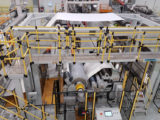
COVID-19 crisis gives the label Made in Germany a new shine in the aluminium packaging sector
May 30, 2020In the aluminium industry,
some markets, such as the automotive industry, have been hit to the core by the
corona crisis, resulting in extremely painful declines in incoming orders and
sales. However, there was also positive news from other markets of the aluminium
industry, such as the packaging sector, according to Gesamtverband der
Aluminiumindustrie e. V. (GDA).
The aluminium packaging industry remained robust
even during the crisis due to lively demand from the beverage, food and
pharmaceutical sectors. The declining demand from traditional and in particular
high-priced cosmetics segments was compensated for in part by the booming
demand for hygiene products such as disinfectants.
After initial impairments in the cross-border
transport of goods, German manufacturers of aluminium packaging report smoothly
functioning supply chains for incoming and outgoing goods. Thus, in no phase of
the corona crisis was there an undersupply of aluminium, printing inks,
varnishes, closures and finished packaging. “The ‘Made in Germany’ quality
label has once again been emphatically confirmed here and ensured maximum
customer satisfaction,” says Johannes Schick, chairman of GDA’s Tubes,
Cans and Impact Extruded Parts Division.
In some cases German manufacturers, who have
well managed the corona crisis so far thanks also to the active support of
trade associations and politicians, have been able to stand in for
manufacturers from other countries and supply customers with quality products
in these difficult times. In addition to flexible and tailored production
planning in the companies, the activities of the associations were particularly
helpful here, which ultimately led to confirmation by the responsible Federal
Ministry of Food and Agriculture that packaging is an essential component of
the system-relevant food supply for the German population. “GDA’s support
was of great value to us in the intensive discussions at state, district and
municipal level because it also helped to ensure smooth operations in times of crisis,”
emphasises Johannes Schick.
However, the pleasing customer demand in the
first four months of this year has now given way to significantly reduced order
activity in some market segments. The inventories built up by customers, the
falling demand for cosmetic products from parts of Europe and major export
markets such as the USA and Latin America, where the crisis only began to show
its devastating effects after a time lag, are causing many customers to act
more cautiously.
Johannes Schick is therefore looking ahead to
the coming months with slightly muted optimism: “We hope that the
reduction in inventories now underway among customers, the changed consumer
behaviour in some core markets and weakening export markets are only a
temporary phenomenon and will not have a negative impact on the utilisation of
production capacities of German manufacturers.”
